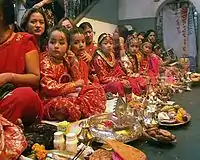Ihi
Ihi, Ehee (Nepal Bhasa:ईही) is a ceremony in the Newar community in Nepal in which pre-adolescent girls are "married" to the Suvarna Kumar which is a symbol of the god Vishnu, ensuring that the girl becomes and remains fertile.[1] It is believed that if the girl's husband dies later in her life, she is not considered a widow because she is married to Vishnu, and so already has a husband that is believed to be still alive.[2]

Ihi is falsely labeled as "Bel Bibaha". However, this naming is incorrect as "Bel Bibaha" would mean marriage to a fruit Bel(or Bael). At the core of the Ihi is a traditional Hindu ceremony of marriage, but the spouse is Visnu/Narayana.[3]
This ritual has been in practice since hundreds of years. It is very sacred ritual and a real kanyaadaan as a virgin girl is handed over to the God. Actually, in Ihi girl is married to a golden statue of lord Vishnu known as Suvarna Kumar and Bel fruit is given as its witness. As bel fruit (wood apple) has a peculiar quality of not getting rotten and remaining fresh forever, it is sometimes considered as Divya Purusha (divine male) or incarnation of the god. This ceremony lasts for two days. All the rituals of a Hindu marriage are performed in this ceremony. So, these rituals need not be performed again while getting married with a man. That's why in Newars it is not necessary for a Groom to go in wedding procession [janti (nep.), Baraat (Hindi)]. The family members and friends bring the bride to groom's house where few rituals are performed. But nowadays newar grooms take part in their wedding procession hence the wedding in this community has become a bit lengthy as compared before.
A second marriage, known as the Bahra ceremony or Sun marriage, occurs before a girl's first menstruation, which starts with a seclusion in a dark room for twelve days.
See also
- Kanyadan
- Iihipaa
- Marriage in Hinduism
References
- "Little Newari girls attend Bel Marriage in Nepal". news.xinhuanet.com. Retrieved 9 May 2016.
- "Ex-Kumari of Bhaktapur looks forward to devoting her time to studies". Kathmandu Post. Retrieved 9 May 2016.
- "Mesocosm". publishing.cdlib.org. Retrieved 2020-11-10.
Further reading
- Gutschow, Niels; Michaels, Axel & Bau, Christian (2008). "The Girl's Hindu Marriage to the Bel Fruit: Ihi and The Girl's Buddhist Marriage to the Bel Fruit: Ihi". Growing Up—Hindu and Buddhist Initiation Ritual among Newar Children in Bhaktapur, Nepal. Wiesbaden, GER: Otto Harrassowitz Verlag. pp. 93–173. ISBN 3447057521.CS1 maint: uses authors parameter (link)